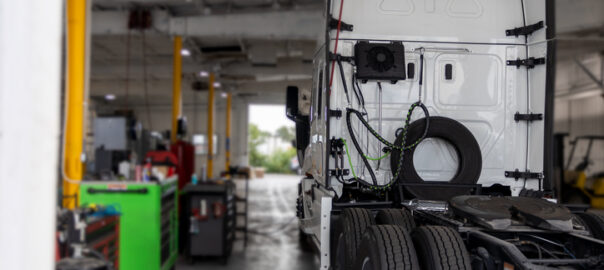Truck maintenance can take the form of either prevention or repairs. Putting off preventative measures can cost more in the long run, not only in parts and service charges but in time spent off the road. Telemetric safety data does not catch everything. Truck drivers are a fleet’s first line of defense when it comes to determining how well a truck operates. Use these tips to keep your tractor and trailer in top shape.

How to Maintain Trucks
Schedule Maintenance Tasks
Do not rely on memory alone to check your equipment often. Inspect your truck inside and out and make a list of each item and how frequently. Review the list with a certified mechanic to ensure you have covered everything. You can use a calendar app on your laptop or smartphone to remind you when it is time for a professional check-up.
Schedule Repairs and Preventative Maintenance Together
Since you have a preventive maintenance checklist, use it to your advantage. When your truck is in for repairs, have the mechanic check items that are due or nearly due for replacement. Being proactive can help avoid a second round of downtime and save money on repairs.
Use a Trip Checklist
Reduce your chances of a breakdown or road violation by using a trip checklist. Inspect items both before and after your run. At a minimum, your list should include these items:
- Check lights and signals, including marker lights, tail lights, headlights, high and low beams, and turn signals.
- Ensure tire tread depth is at least 4/32 on steering tires and 3/32 for tires in other positions.
- Inspect for oil leaks in and around the engine, transmission, differentials, and wheel seals.
- Look for leaks in the air system or signs of rubbing and chafing on the hoses.
- Ensure brake shoes aren’t worn and that trailer ABS lights are working correctly.
- Check fluids, including oil, and get oil changes as needed. Also, check coolant levels and brake fluid, but don’t rely on overflow tanks to be accurate.
- Check windshield wipers to ensure they are working properly. Take care of windshield chips and cracks to avoid visibility hazards.
Do not Put Off Repairs
It may be tempting to put off repairs to make numbers, but doing so can cost more in the long run. Taking a few minutes to correct a minor issue can be well worth avoiding the headaches that come later.
Maintaining Your Trailer
Proper trailer care is just as necessary as your truck’s maintenance.
Check Air Pressure
Maintaining proper tire pressure can improve fuel economy and help tires last longer. Since truck drivers do not always have time to perform manual checks, professionals recommend pressure monitoring or inflation systems. However, you should inspect these systems periodically. Check supply hose connections, pressure settings, power fuses, and valve shut-off positions regularly to keep the system operating at peak efficiency.
Inspect Suspensions
Air springs should be routinely checked for signs of irregular wear, tears, or heat cracks. Make sure the air pressure is equal and at the right level. Keep the trailer at the correct ride height as well. Trailers that ride too high may catch on an overpass, while trailers that ride low can damage suspension components.
Keep the Underside Clean
Chemicals used to de-ice roads can cause corrosion that damages wiring and metal parts. When washing your truck, take time to clean the undercarriage. Experts recommend washing trailers every 45 days and a shop inspection every 45 to 60 days.
Check the Inside
Look for broken cross members or holes in the roof. Leaks can damage valuable cargo. Inspect tie-down straps, chains, and winches for signs of wear. Replace metal parts that show signs of rust and frayed or broken straps. A little dirt on nylon straps is fine; washing them weakens the material and reduces their effectiveness.
However, replace straps with embedded particles if the debris can’t be removed.
Take the time to keep your tractor and trailer in tip-top shape. Well-kept trucks run more efficiently and help you stay on the road longer.


